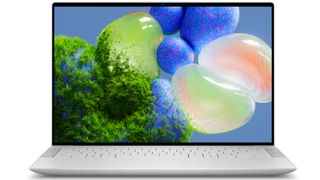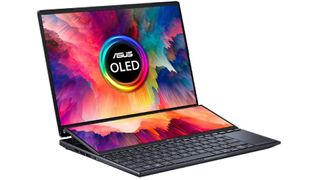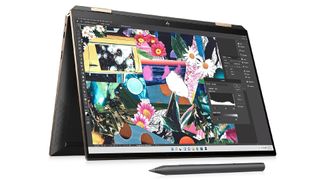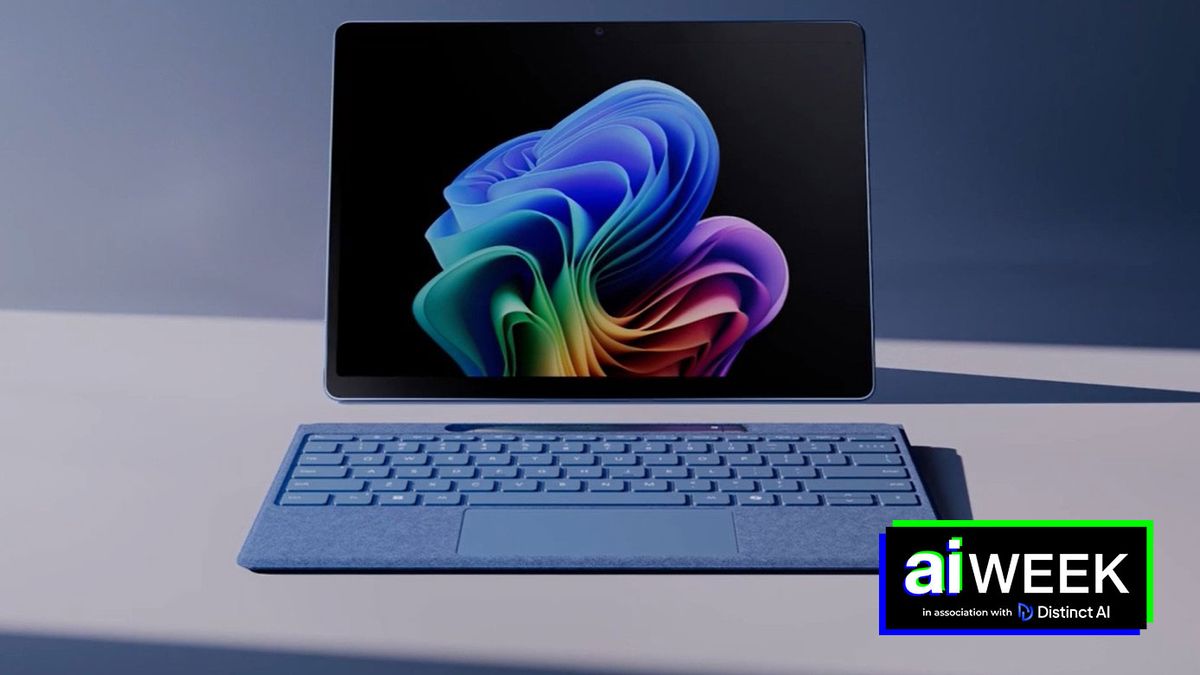So, you’ve probably just got your head around AI, short for artificial intelligence. We’ve previously answered your questions around AI art, and what generative AI art means for creativity. But so far, the topic of AI has all been based around what can be done with tools and software, and primarily software based in the cloud. Nothing to do with the hardware you use to access it.
What on earth, then, is an AI laptop?
You might be forgiven for thinking laptop makers are trying to pull a fast one here, and it’s just an empty marketing buzzphrase. But in fact, AI laptops are a real thing.
That doesn’t mean they’re shoo-ins for our list of the best laptops for graphic design, though. Equally, whether these are the best laptops for 3D modelling, is also open to debate.
In this article, we’ll explain what an AI laptop is, what it can do, and whether it’s worth spending money on one. All in a way that’s as jargon-free and easy to follow as possible.
What is an AI laptop?
AI laptops work in the same way as normal laptops. You open them up, click on Photoshop, your web browser, your Word document or whatever and use them in exactly the same way you’re used to doing. The main difference is that they contain specialised hardware that should (in theory) make them work faster and more smoothly on specific AI tasks.
This specialised hardware is called a Neural Processing Unit (NPU), and it works alongside the traditional components like the CPU and GPU.
Lost already? Then let us explain. The CPU, or Central Processing Unit, is the “brain” that lies at the heart of every laptop, and handles general computing tasks. The GPU, or Graphics Processing Unit, handles graphics-intensive workloads such as video editing and gaming.

Finally, the NPU or Neural Processing Unit is a relatively new proccesor dedicated to accelerating AI-specific workloads, often performing these tasks exponentially faster than a CPU alone.
Still lost? Then the simpler version is that a laptop with an NPU (an AI laptop) promises to be faster. Much faster, in fact. But only for certain specific tasks which are based on AI.
What can an AI laptop do that’s special?
So are they worth buying? Well, that’s another story.
Right now, no one’s really able to give concrete examples of software that will run exceptionally well on an AI laptop, as opposed to a normal laptop. And that’s because this new hardware has only recently emerged, not many people have it, and there isn’t much software that’s designed to take advantage of it.
For example, while Adobe has pledged to optimise future versions of Premiere Pro for NPUs, you won’t find such performance gains in the current version. Currently, all the workload of running Premiere Pro is handled by the CPU or GPU. So using it on an AI laptop won’t be any different from doing so on a normal laptop.
In other words, we’re in a classic chicken and egg situation. Until sufficient numbers of people buy an AI laptop, there’s little incentive to develop the “killer app” that will make sufficient numbers of people want to buy an AI laptop.
Who would find an AI laptop useful?
Right now, then, the main audience for AI laptops will be people working in AI software themselves, people with lots of cash to spare who just to like to have the latest cool thing (known as “early adopters”), and people who want a laptop that’s future-proof.
Assuming you don’t fit into the first two categories, is it sensible to buy an AI laptop for benefits in future? Well, there’s an argument to be made that if you’re buying a new laptop anyway, you might as well get an AI laptop. It’d be a bit like buying an 8K TV: even though there are no 8K broadcasts yet outside of Japan, there surely will be in years to come… right?

In a similar way, the idea is that even if you can’t measure the advantage of an AI laptop right now, when the cool stuff comes down the line, you’ll be ready.
What software is designed for AI laptops?
What will that “cool stuff” look like? Well, as a creative pro, you’ll most likely be looking at faster creative software, particularly if you work in resource-heavy areas such as 3D or video editing. Adobe in particular has made AI its singular obsession over recent years, and we fully expect them to harness the power of AI laptops in its Creative Cloud apps in due course.
The question, however, is how much of a difference will that actually make.
The honest answer is that we don’t know, and won’t know for some time. The desire is there amongst Adobe’s software developers, definitely. But will that add up to actual results? In general, Adobe actually has a bit of a shoddy reputation for bloated code that never runs as fast as you want to. So you might actually find you get a better speed boost on your present laptop by trying a more lightweight alternative, such as Affinity’s suite of apps, or a browser-based service like Figma (which ironically Adobe tried but failed to buy).

What about more general AI software? Well, the one most people are excited about right now is Windows Copilot, or rather how it will develop in future. Copilot is basically an AI chatbot that helps you use your Windows operating system. Microsoft announced it’s testing a new feature called Recall, which takes a screenshot every few seconds. That will allow you to search and retrieve everything you’ve ever done on your computer.
This could prove incredibly useful. It could also be a massive danger to your privacy and security. However, if it still sounds like something you fancy, they youll need to buy one of the planned new range of Copilot+ PC notebooks, with an NPU capable of 40 trillion operations per second (TOPS) and a dedicated Copilot key on the keyboard. For example, the forthcoming Surface Pro 10 will feature an NPU with 45 TOPS.
Copilot+ PC notebooks are scheduled to launch on 18 June. Many others AI laptop on the market today, though, won’t have the capacity to run Recall. For example, the NPS in the Dell XPS 14 (9440), ASUS Zenbook Duo (2024) and HP Spectre x360 14 (2024) all only offer 10 TOPS.
More generally, the next major Windows update is expected to heavily integrate AI into all aspects of the operating system. In which case, having an AI laptop may well be useful. But ultimately, at this stage, nothing is certain.
Are AI laptops good for general computing?
Although AI laptops are specifically designed for, well, AI, they’re also a pretty good choice for general computing tasks. As you’d expect, the new generation of NPUs are doing everything a little faster and more efficienty.
In our reviews of the latest AI laptops, such as the ASUS Zenbook Duo and ASUS Zenbook 14 OLED, we’re measuring 20% better Geekbench scores in comparable models over 13th gen Intel processors, and up to double the battery life. That’s pretty significant, and speeds are fast improving beyond this point. We’re already getting NPUs that are four times as powerful as the ones introduced at the start of this year.
All of which makes logical sense, because the whole point of an NPU is that it can take over some of the tasks normally performed by the CPU and GPU, freeing them up to work more quickly and reduce the drain on the battery.
That doesn’t necessarily mean, though, that AI laptops are automatically going to be the fastest on the market at everything. For example, for some tasks you may get better performance overall from a laptop with no NPU but a very powerful GPU, as found in the best gaming laptops.
Conclusion: Should I buy an AI laptop?
So what does all this mean? Should you buy an AI laptop? Well, if you work in AI yourself and you want to try stuff out that you’re developing, you almost certainly should. Like how an 8K TV is a good choice for someone who’s actually filming with an 8K camera.
What if you don’t, but you use a lot of AI tools? Well, that’s going to depend on what they are. With most of the popular ones, such as Midjourney or ChatGPT, all the processing takes place in the cloud, so using an AI laptop won’t make much difference. The same goes for Adobe Firefly in Photoshop, AI features in Microsoft Word, and countless other examples.
It will make a difference, though, if the AI software has been purpose built to take advantage of NPUs. For example, if you want to take advantage of Windows Studio Effects in Windows 11 (which lets you blur your background, clean up the audio clearer, and make it look like your eyes are staring directly into the camera), you’ll need an AI laptop to use it.
However, right now, there aren’t a lot of similar examples to share.
That will obviously change in future, especially as the next iteration of Windows (which may or may not be called Windows 12) is probably going to be stuffed full of AI. And as more and more people get AI laptops, more and more software developers will make tech specifically for them, including AI plugins to existing tools. We’re expecting this autumn’s Adobe Max event, for example, will be chock-full of such announcements.
That said, there’s no guarantee that the AI laptop you buy today will be capable enough for this future tech. For example, the coming Recall feature in Windows Copilot won’t work on many existing AI laptops, making the idea of AI laptops being “future proof” a bit more questionable.
So should you buy one or not? If you’re invested in AI, or if you’re just an early adopter who likes messing around with cool stuff, we’d say definitely yes. And even if neither applies to you, these are broadly speaking very powerful laptops that are good for general computing anyway. At the same time, though, don’t automatically opt for an AI laptop, because a laptop with a more powerful GPU may offer better performance for creatives overall, even if it’s not NPU-enabled.
